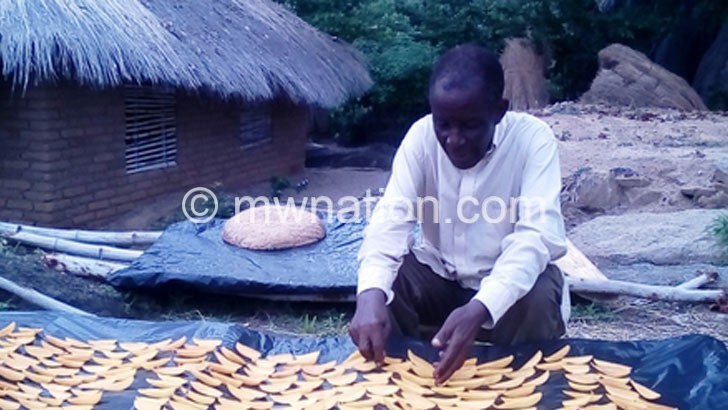Gold in dried mangoes
Mango fruit trees grow well across Malawi, and the fruit is one of the richest sources of vitamin A when eaten ripe.
The fruit coincides with the rainy season when families in rural areas get busy with cultivation of crops in their fields.

Since the fruit is seasonal, lack of value addition leads to many mangoes getting rotten and being wasted. In the absence of machinery and other resources to process the fruit into juice, communities in Nkhata Bay District are drying the fruit for sale.
Village head Mijumiju of Sub-Traditional Authority (ST/A) Mkondowe is one of the pioneers of dried mango business in the district.
He says when he started drying mangoes in 2004, people thought he was insane.
“They said I was becoming mad,” he says.
But Mijumiju testifies that over the years, he has made a considerable amount of money through the business.
“This year, I have an order to export one metric tonne of dried mangoes to Germany,” he says.
Mijumiju, who sells the dried mangoes in Mzuzu City and at Nkhata Bay Boma, says currently demand for the product is higher than supply.
“A 50-kilogramme [kg] bag of dried mangoes fetches about K300 000 [$409] outside the country. I usually send a few kgs that I can afford to dry to my friend in Germany,” he says.
The 72-year-old man encourages his subjects to venture into the business to fight poverty in line with Sustainable Development Goal (SDG) One of ending poverty in all its forms.
He bemoans that many people in rural areas do not think big to tap from opportunities within their areas.
“We need to start utilising the natural resources God gave us to transform our lives. There is gold in dried mango business but Malawians have not yet explored it, yet fresh mangoes just rot in times of plenty.
“I have been encouraging my subjects and members of my family, including my children to start doing this business,” he says.
Esaya Paulo, 23, of Ruarwe area in T/A Boghoyo in the district is now following Mijumiju’s footsteps.
“This is the first time for me to dry mangoes. I was told that there are some Danish people who usually come here to buy dried mangoes.
“I want to dry mangoes weighing 20 kgs which I intend to sell in January so that I can raise capital to start another business,” Paulo says.
Another player in the trade, Tryphine Nyirenda, says one kg pack of dried mangoes goes at K3 000 and that he expects to earn not less than K70 000 from the little she has already processed.
“I will sell some to Danish people who usually visit our area at the beginning of every year and keep some for our household consumption,” Nyirenda says.
A survey conducted by University of California-Berkeley in 2009 titled Commercial Opportunities for Fruits in Malawi reveals that fruits have low demand within the country.
The survey report states that most Malawians do not perceive much value in fruits and that they consume fruits primarily as snacks because awareness of nutritional benefits is low.
It further says ability to pay for a fruit is low among Malawians and that they have difficulties to preserve fruits which already have short lifespan.
SDG II emphasises on ending hunger, achieving food security, improving nutrition, and promoting sustainable agriculture.
To this effect, Nkhata Bay district food and nutrition officer Malani Hauli says mango production in the district is high, hence the need to start processing it into other valuable products.
He commends sun drying as a good initiative that enables community members access important vitamins and minerals for prevention of micronutrients deficiency disorders.
Hauli says a long-term measure for addressing issues of malnutrition is diversification of food production which leads to consumption of a diversified diet (six food groups) at household level.
He adds that availability of some foods, such as fruits and vegetables, is seasonal; therefore, processing them is the only way of making them available for consumption by household members all year round.
“Mangoes can be processed into various products depending on the state at which they are.
“Ripe mangoes can only be processed into liquid products such as juices. Half ripen ones can be sliced and sun dried using solar dryers; this is a hygienic and safe method.
“Solar drying helps reduce food contamination as well as nutrients loss, especially vitamin C,” Hauli says.





